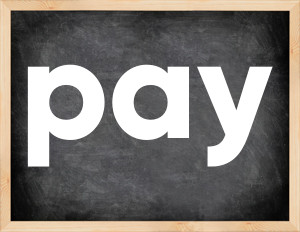 The English verb 'pay' is pronounced as [peɪ].
The English verb 'pay' is pronounced as [peɪ].
Related to:
irregular verbs.
3 forms of verb pay: Infinitive (pay), Past Simple - (paid), Past Participle - (paid).
Here are the past tense forms of the verb pay
👉 Forms of verb pay in future and past simple and past participle.
❓ What is the past tense of pay.
Pay: Past, Present, and Participle Forms
| Base Form | Past Simple | Past Participle |
|---|---|---|
| pay [peɪ] |
paid [peɪd] |
paid [peɪd] |
What are the 2nd and 3rd forms of the verb pay?
🎓 What are the past simple, future simple, present perfect, past perfect, and future perfect forms of the base form (infinitive) 'pay'?
Learn the three forms of the English verb 'pay'
- the first form (V1) is 'pay' used in present simple and future simple tenses.
- the second form (V2) is 'paid' used in past simple tense.
- the third form (V3) is 'paid' used in present perfect and past perfect tenses.
What are the past tense and past participle of pay?
The past tense and past participle of pay are: pay in past simple is paid, and past participle is paid.
What is the past tense of pay?
The past tense of the verb "pay" is "paid", and the past participle is "paid".
Verb Tenses
Past simple — pay in past simple paid
(V2).
Future simple — pay in future simple is pay (will + V1).
Present Perfect — pay in present perfect tense is
paid
(have/has + V3).
Past Perfect — pay in past perfect tense is
paid
(had + V3).
pay regular or irregular verb?
👉 Is 'pay' a regular or irregular verb? The verb 'pay' is irregular verb.
Examples of Verb pay in Sentences
- They haven't paid the gas bill yet (Present Perfect)
- She paid him $19 to cut the trees (Past Simple)
- We forgot to pay all your bills (Past Simple)
- Now it's time to pay me back (Present Simple)
- Are you paying for the table? (Present Continuous)
- He is not paying attention to that issue, but certanly should (Present Continuous)
- Jack's never paid his bills, becausу hiis parents did that for him (Past Simple)
- Have you already paid him ? Let's go! (Present Perfect)
- My parents won't pay for my wedding (Future Simple)
- Now he will pay attention to his wife (Future Simple)